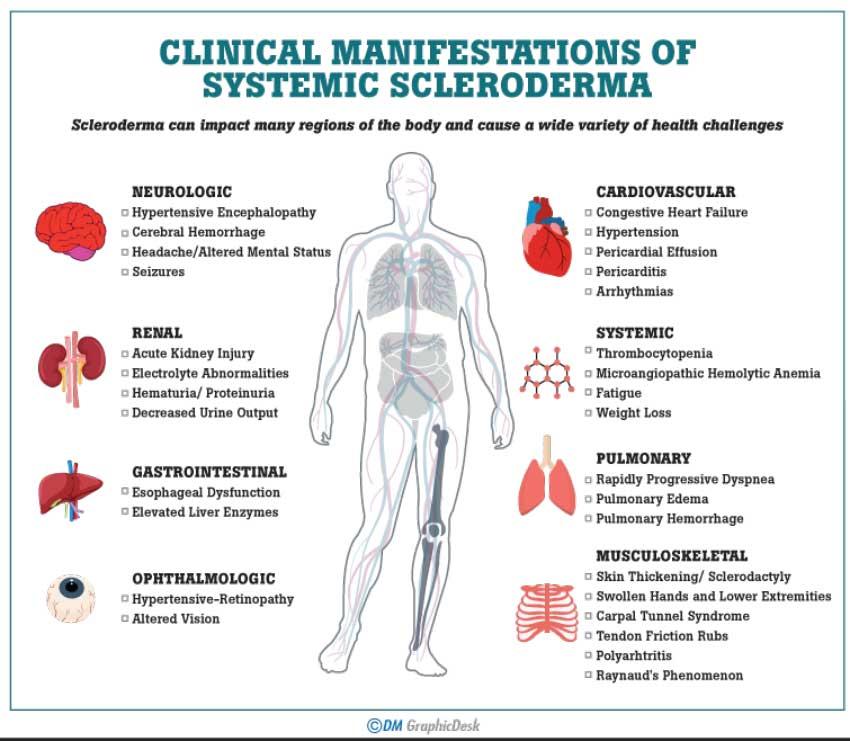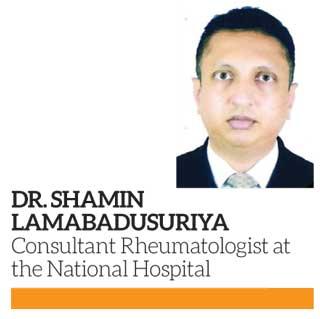20 Aug 2021 - {{hitsCtrl.values.hits}}

 ‘Health is wealth’ they say and the present era-with the COVID pandemic in the background- is slowly making us realise the real depth in this statement as there are several aspects of good health you cannot just buy for money; even if you are the wealthiest man alive! There are several diseases without a complete cure which pretty much tallies with the above description. This can create an overwhelming impact on the quality of life of patients as well as their loved ones, if illness is not attended to early. “Being a disease characterised by skin thickening and hardening which is similar to what happens after sustaining and recovering from severe burn injuries, Scleroderma is a rare, autoimmune connective tissue disorder which can create a major impact on your life once affected,” says Dr Shamin Lamabadusuriya, Consultant Rheumatologist at the National Hospital.
‘Health is wealth’ they say and the present era-with the COVID pandemic in the background- is slowly making us realise the real depth in this statement as there are several aspects of good health you cannot just buy for money; even if you are the wealthiest man alive! There are several diseases without a complete cure which pretty much tallies with the above description. This can create an overwhelming impact on the quality of life of patients as well as their loved ones, if illness is not attended to early. “Being a disease characterised by skin thickening and hardening which is similar to what happens after sustaining and recovering from severe burn injuries, Scleroderma is a rare, autoimmune connective tissue disorder which can create a major impact on your life once affected,” says Dr Shamin Lamabadusuriya, Consultant Rheumatologist at the National Hospital.
A ‘Connective Tissue Disease’ 
Connective tissue amounts to the tissue that fills the space between cellular structures and present anywhere in the body. Therefore, although this disease is termed as scleroderma, it can affect not only the skin, but also almost all the organ systems of the body through fibrous tissue deposition. Scleroderma can either be present from birth or acquired later in life. There are two types of Scleroderma • Only involves skin (localized)- Morphea Internal organs involved-systemic sclerosis
Systemic Sclerosisrare yet debilitating
Although the exact cause of this condition is unknown both hereditary (that is transmitted through genes) and environmental triggering factors are implicated as causative factors. Therefore it is important to check if any of your blood relatives are having a connective tissue disease or an immune system/antibody mediated disease. Also, environmental exposure to silica, solvents and radiation may play a role in this condition. However in most patients, it is difficult to establish a proper cause. “Systemic sclerosis affects between 38-341 individuals per million throughout the world (prevalence) and develops in 8-56 individuals per million each year (incidence). However, when it comes to connective tissue diseases it is comparatively a rare disease and females are 4-9 times more affected than males.
Presentation
“Systemic sclerosis can affect almost any organ in the body and manifest as a multitude of features. The most common feature is known as Raynaud’s phenomenon. This is when your fingers, toes, earlobes or tip of your nose are oversensitive to cold stimuli and there is intense pain and characteristically change of colour from white to blue to bright red in these areas, due to reduced blood supply because of narrowing of the small blood vessels supplying these areas due to fibrosis and thickening of the blood vessel walls (vasculopathy),” explains Dr Lamabadusuriya. “Although skin thickening is a cardinal feature of Systemic sclerosis, it may go unnoticed early in the disease. Also as Sri Lanka does not have winter weather, Raynaud’s phenomenon does not manifest commonly here compared to colder countries. Therefore, patients with Systemic sclerosis tend to present late to doctors in Sri Lanka which adversely affects their treatment and outcome.” underscores Dr Lamabadusuriya.
Diagnosis
The disease process in Systemic sclerosis is fundamentally driven by an overactive immune system which produces antibodies against our own body’s organs (Auto-antibodies). Therefore it is diagnosed by doing blood tests to detect these autoantibodies which include ANA, Anti-Centromere, AntiSCL70 and Anti RNA Polymerase III. (Although in 5% of patients all these tests will be negative)
Treatment and prevention
Treatment for Systemic Sclerosis depends on the organ system involved and may have to be a combined effort of a multidisciplinary specialist team. Thanks to the latest advances in evidence based science and medicine, clear guidelines have been established to treat scleroderma patients for all their organ manifestations. “As for extensive skin thickening, drugs such as Mycophenolate Moefetil(MMF), Methotrexate(MTX) and Cyclophosphamide can be used. However, high dose steroids(e.g. Prednisolone) should not be used in these patients as they could precipitate a medical emergency called Scleroderma renal crisis” explains the doctor. Prevention of systemic sclerosis should address the underlying cause Since there is no clear cause for scleroderma identified, general precautions like avoiding marriages between families with connective tissue/immune mediated diseases and avoiding environmental exposure to silica, solvents and excess radiation can be adviced.
Covid-19 and scleroderma
Patients with systemic sclerosis should be motivated more to obtain the Covid-19 vaccine since they are at a higher risk of getting Covid-19 related complications due to the underlying pathology. Also it is advised to avoid MMF or Methotrexate for 1 week after obtaining the vaccine.
A cure for Systemic sclerosis in the horizon
“Fortunately, there is a new research which indicates that there might be a cure for Systemic sclerosis in the horizon, but this special therapy known as Autologous Stem Cell Transplantation is not available in Sri Lanka at the moment as far as I know,” says Dr. Lamabadusuriya.
Take home message
Undiagnosed Scleroderma can completely turn your world upside down if early diagnosis and therapeutic interventions are not made in time. Therefore, if you notice that your extremities are oversensitive to cold or if you notice any skin thickening anywhere in your body, please seek expert medical advice without further delay
21 Dec 2024 7 minute ago
21 Dec 2024 13 minute ago
21 Dec 2024 1 hours ago
20 Dec 2024 9 hours ago
20 Dec 2024 20 Dec 2024